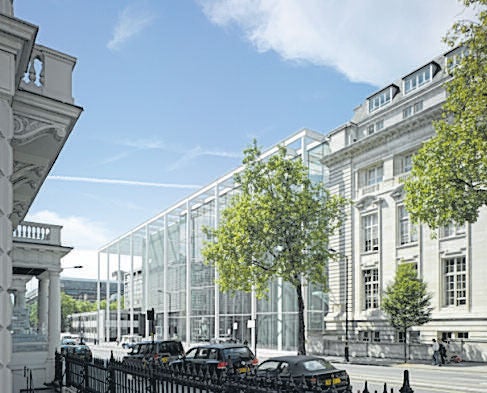Imperial College Business School

Your support helps us to tell the story
From reproductive rights to climate change to Big Tech, The Independent is on the ground when the story is developing. Whether it's investigating the financials of Elon Musk's pro-Trump PAC or producing our latest documentary, 'The A Word', which shines a light on the American women fighting for reproductive rights, we know how important it is to parse out the facts from the messaging.
At such a critical moment in US history, we need reporters on the ground. Your donation allows us to keep sending journalists to speak to both sides of the story.
The Independent is trusted by Americans across the entire political spectrum. And unlike many other quality news outlets, we choose not to lock Americans out of our reporting and analysis with paywalls. We believe quality journalism should be available to everyone, paid for by those who can afford it.
Your support makes all the difference.Age: 25
History: The business school is a central part of Imperial College London and its programmes reflect the university's reputation for medicine, science and technology.
Address: South Kensington campus, London
Ambience: Located in a dynamic new building, designed by Lord Foster's team of architects .
Vital statistics: The school offers full-time, executive weekday, executive weekend and distance learning MBAs. Specialist Masters programmes are available in finance, risk management and financial engineering, and international health management. There is also a thriving Doctoral programme.
Added value: Imperial is renowned for its innovation and the MBA is consistently ranked in the top 10 worldwide for entrepreneurship. Students leave knowing how to create, scrutinise and exploit opportunities, which will come in useful when working for a large organisation or when setting up your own business.
Easy to get into? Minimum requirements are at least three years' of work experience and a good undergraduate degree. The GMAT is also needed for the full-time MBA with a minimum score of 600 required. For those without work experience, specialist Masters programmes require an undergraduate degree with a 2.1 minimum.
Glittering alumni: Jeff Molobela, chairman, Telkom SA Ltd, Professor Nicholas Fisk, director of the University of Queensland's Centre for Clinical Research, Australia
Gurus: William Perraudin, a key adviser to the Basel Committee on the future of global banking regulation; Nelson Phillips, formerly Beckwith professor of management at Cambridge; David Gann, head of the innovation and entrepreneurship group and consultant to a number of leading companies.
International connections: Around half of full-time students are from outside Europe, and most of the faculty have international backgrounds.
Student profile: Average work experience is six years on the full-time and eight years on the executive MBA. Female students account for 16 per cent of the total on the full-time MBA and 26 per cent of the executive option.
Cost: £35,850 for the full-time MBA; £39,500 for the executive weekday MBA.
Return on investment: The latest full-time MBA salary increase figure is 40.5 per cent for the class of 2007/08. The previous cohort saw a 79.5 per cent salary increase.
Who's the boss? Professor David Begg, an adviser to banks, international agencies and leading companies.
Prospectus: +44 (0)20 7594 9206; www.imperial.ac.uk/business-school; business-school@imperial.ac.uk
Join our commenting forum
Join thought-provoking conversations, follow other Independent readers and see their replies
Comments